
Organizations are implementing the HOPE framework across the country
The HOPE framework centers around the Four Building Blocks of HOPE, or key types of positive childhood experiences (PCEs): safe and supportive relationships that are critical for children to develop into healthy, resilient adults; safe, stable, equitable environments to live, learn, and play; opportunities for social and civic engagement to develop a sense of belonging; and opportunities for emotional growth. This framework has helped to transform care across the United States.
This year, we received funding from the National Institute of Child Health and Human Development (NICHD) to hold four in-person convenings following our Fourth Annual HOPE Summit. Over the summer we brought people together in Massachusetts, California, and Tennessee. At each convening, 30 to 60 individuals from organizations at various stages of the HOPE framework implementation process were in attendance. Together, we discussed achievements and explored common goals for the next year. As the director of HOPE, I made sure to attend all three convenings – which made for a wonderfully informative and inspiring summer!
Fostering networks through in-person meetings
The first meeting was held on the Tufts University main campus in Medford, Massachusetts in June with help from HOPE Champion, Stephanie Patton. Participants included early childhood educators, leaders of community coalitions, health care providers, academics, and individuals affiliated with various state agencies. A big take away from the discussion was about bringing the HOPE framework to education settings, an opportunity identified by community coalitions leaders and parents. Some school districts, for example, had policies in place where student substance use led to school suspension. Attendees involved in youth substance use prevention noted that this policy is counterproductive. Vulnerable students can lose their ability to engage at school, and lose access to the relationships and engagement of school participation. In fact, the group had a general opinion that school teachers and counselors want the opportunity to engage their students using a strength-based, rather than punishment-oriented, approach, especially given the epidemic of adolescent anxiety and depression since the start of the pandemic.
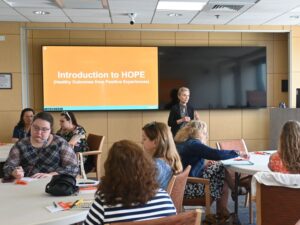
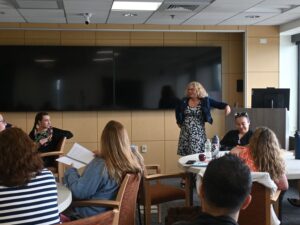
The convening in Sacramento, California was sponsored by the First 5 of Sacramento Commission and took place in June with help from HOPE Champion Alexandria Paige. California’s First 5 coalitions provide support for children from birth to age five as well as their families. They sponsor and coordinate efforts that help children building a strong foundation to help them enter school ready to learn. Attendees included those who graduated of First 5’s Parent Training Leadership Institute. We discussed barriers to implementation, with many of the smaller agencies in attendance finding that learning about HOPE and training staff was difficult to accomplish. The group conversation centered on the possibility of having First 5 Sacramento sponsor quarterly HOPE training sessions for new and existing staff members to learn about the HOPE framework and have the opportunity to form informal networks. Local HOPE champions and facilitators identified that these sessions could be taught by parents who had participated in programs run by the county. Those who graduated from the Parent Training Leadership Institute could become certified HOPE facilitators.
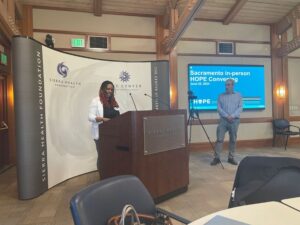
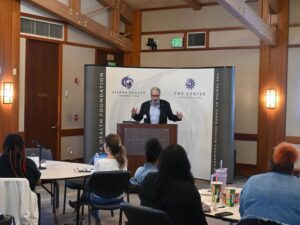
In August, we held our third convening in Nashville, Tennessee. The meeting led off with a short talk by Richard Kennedy, Executive Director of the Tennessee Commission for Children and Youth. The meeting began with presentations from two statewide initiatives. The Association of Infant Mental Health in Tennessee (AIMHiTN) has adopted HOPE in its statewide programming, and has reached hundreds of professionals, foster parents, and parent leaders. This large group has monthly meetings where they exchange ideas about how the HOPE Framework supports their efforts. Next, the Tennessee’s Regional Intervention Program (RIP) presented. This organization serves families with concerns about their children’s behavior, many of whom have been referred by child services. RIP has integrated HOPE introduction trainings and has now trained over 500 staff members including frontline staff, case managers, and family support workers. RIP includes a 30-minute HOPE framework summary in all of their parent workgroups. They have used HOPE in their work with over 500 families, 35 staff members, and 500 professionals. April Scott from Centerstone and Angie Miller from the Tennessee Department of Health were in attendance – each of whom has led efforts to integrate the HOPE framework into the fabric of services for children and families throughout the state. We look forward to watching the HOPE framework blossom in Tennessee, and to continuing to learn from them. I left Nashville profoundly impressed with the people who work so hard for the families in their communities, and over joyed that the HOPE framework is helping move this amazing work forward with PCEs at the forefront.
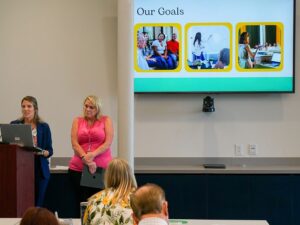
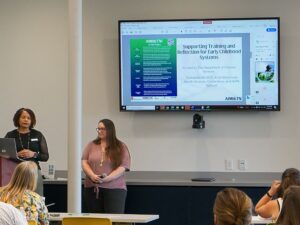
These regional meetings highlighted the way that the HOPE framework has inspired transformation around the country. I am so thankful to our team for the work we have done to launch the HOPE National Resource Center, and seeing how the innovation of the HOPE framework has spread across the country, and across sectors. Our challenge will be to continue to support innovation, share knowledge, and work to ensure that our collective energy will help improve equitable access to the many positive childhood experiences that children need to thrive.
Start practicing the HOPE framework in your work
The HOPE framework can be a difference maker in how you promote positive childhood experiences in your work with children and families. Not sure how to start practicing the HOPE framework? Reach out to us with your questions!


